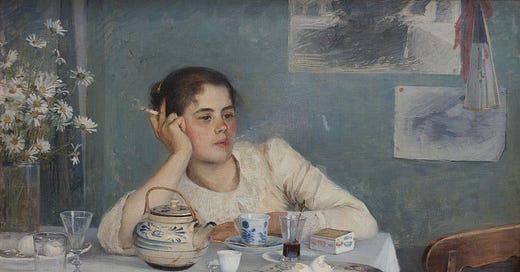I love biographies. They have the power to make me feel like everything is going to be okay and that the things stressing me out right now will, one day, be insignificant. Biographies are proof that you can live, learn, and die, and your glory — big or small — can be preserved untainted by minor setbacks such as parking tickets and romantic rejections. (You think Napoleon Bonaparte never had to deal with post-dinner bloating?) When you observe a human life from a far enough distance, all the trials and tribulations just become rounding errors.
Dostoyevsky said that to love someone means to see them as God intended, so why on earth shouldn’t you also be a ‘someone’? This makes me think that sometimes you have to try to look at yourself through the eyes of God: how tiny and lacking, yet how precious and important; how flawed and powerless, yet unique and loved. To see like God is to see all of time compressed into one tiny book called history, brushing past yourself as just one punctuation in the entire volume. It creates a distance between you and you, making the little insecurities of today look so small in the grand scheme of things.
Let yourself be one single drop of water in an ocean of stories.
There’s something very calming about believing that nobody cares about what you do, that you could just be whatever you want to be. It grants you a kind of unlimited confidence, like flooring the gas pedal on your free will. It’s liberating to think that you’re not special — not because you aren’t valuable, but because you aren’t as offensively powerful as you might think. Humility, or the simple act of focusing less on yourself without reducing your sense of self-worth, can be the ultimate source of peace.
After reading all the beginnings and endings of so many Greats, I’m struck by the realization that one day, I, too, will simply be someone who participated in this grand drama, a character that could be monitored on a cosmic television. Someone who slept and ate and laughed and cried. Someone who raged and nurtured and judged and felt defeated. Someone who loved and grieved and was unreasonable at times.
I wish I could see my entire life in reverse through a nostalgic black-and-white filter, where every challenge is a mere hiccup, incapable of changing the wonderful fate of the legacy I leave behind. I want to see, in hindsight, that misfortunes haven’t hardened my heart — I want to look back and see a survivor. I want to see that heartaches have not smothered my passion and that sadness was not able to keep me down for long.
I want to be the type of woman who ages with grace — that’s to say, someone who eventually stops chasing and welcomes life’s unfolding events with joy. Invites, even. I will no longer brag about anything because there will be no one to impress, and no one’s affirmation will be more valuable than the one I hear in my own heart. I want to celebrate my life, and the years it comprises, with quiet confidence and the admiration of a fan reading about me centuries into the future.
Perhaps it is only through this perspective — this God-like omniscient and retrospective lens — that we can fully embrace our humanity, instead of measuring ourselves merely by a tally of achievements and failures. What if we allowed ourselves to joyfully anticipate tomorrow and gladly mourn yesterday? To adopt courage and accept the fact that we have doubts? To be grateful and channel our ambition for further success? We can celebrate victories and grieve losses at the same time. There is space for both because we are human beings, not scorecards.
Every new rock bottom will become the sturdy foundation upon which you will build your next chapter — this is Rainer Maria Rilke’s “just keep going, no feeling is final” and John Lennon’s “everything will be okay in the end; if it’s not okay, it’s not the end.”
You may be existentially “trapped” in the present, but your perspective doesn’t have to be. With enough distance from your own timeline, every mistake blurs into a minor miscalculation, and every letdown diminishes to insignificance. Even a bad memory, with enough time, will appear trivial — it might transform you but its colors will fade into a wistful sepia.
One day, you’ll look back on whatever you’re sad about and wonder why you were ever so upset.






Great piece for the new year! This line in particular got me thinking, maybe there’s a danger if taken too far.
“There’s something very calming about believing that nobody cares about what you do, that you could just be whatever you want to be.”
The danger may be that the personal importance of one’s responsibilities toward others in life may be diminished. That a sense of duty can and should be a powerful motivator. And that narcissism doesn’t have to accompany one’s awareness of their ability to make a difference in someone else’s life. That others may even be relying on you. You can provide for people humbly, especially when it involves sacrificing the endless possibilities to choose the path of responsibility.
Much needed. Wishing everyone a Happy New!